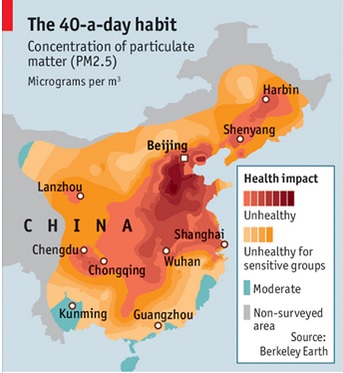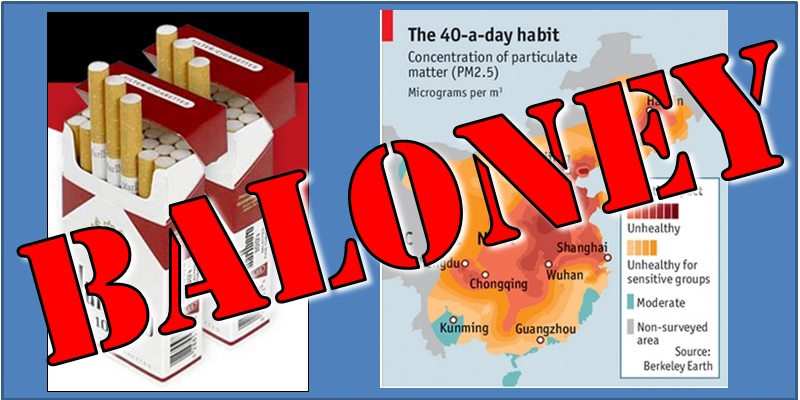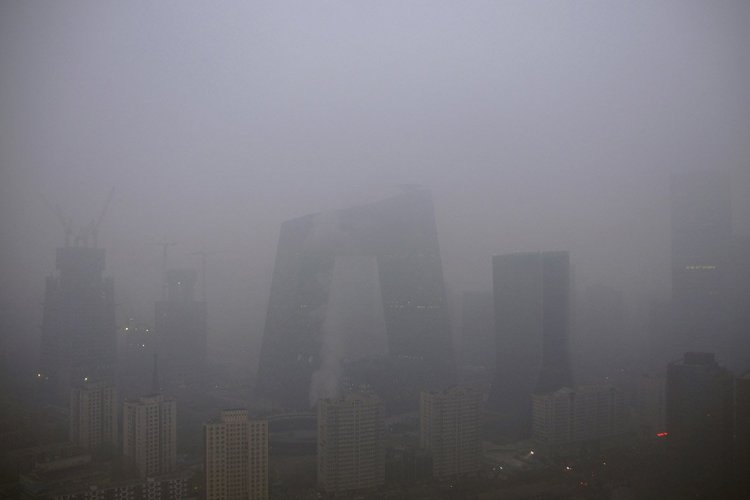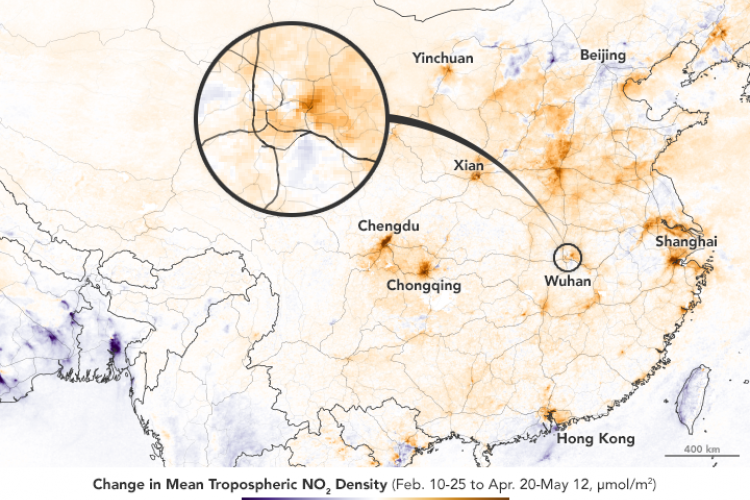No, Living in Beijing is NOT Equivalent to Smoking 40 Cigarettes Per Day
Ah, Berkeley, The Economist: These words ooze credibility at their very core. So when a recent article in The Economist cited a study by an organization called Berkeley Earth claiming that breathing in Beijing is the equivalent of smoking 40 cigarettes per day, the surfing masses conditioned by social media to only read headlines immediately shared it on their streams. The result went viral.
And it is complete horsesh*t.
In short, for those of you who don’t care to read the mathematical calculations below, nowhere in China is the air pollution anywhere near the equivalent of smoking even one cigarette per day – a fact that Beijing’s own Dr Richard St Cyr pointed out in 2011 in this pioneering blog post.
Nevertheless, the editors of The Economist musn't have seen that. They quoted Berkeley Earth, a non-profit organization founded by environmentally-conscious scientists (with no direct relationship to the university in California), saying “Berkeley Earth’s scientific director, Richard Muller, says breathing Beijing’s air is the equivalent of smoking almost 40 cigarettes a day.” This factoid was alluded to in the bold print of The Economist's accompanying graphic, shown below:

The quote appears to stem from a press release from Berkeley Earth, as their study itself makes no reference to cigarette equivalents of Beijing’s air.
But Berkeley director Muller's original statement was, and I quote: “When I was last in Beijing, pollution was at the hazardous level; every hour of exposure reduced my life expectancy by 20 minutes. It’s as if every man, woman, and child smoked 1.5 cigarettes each hour,” he said. The Economist probably multiplied this by 24 hours per day, came up with 36 and rounded up to a nice 40 for measure.
I have no explanation how Muller made his calculation of 1.5 cigarettes an hour (though I'll attempt to reverse-engineer it below).
It could be that he was misquoted; another explanation may be that he fell prey to the age-old measurements mixup, confusing milligrams (one thousandth of a gram, often used when reporting tar and nicotine and other pollutants in cigarettes) and micrograms (one millionth of a gram, used in most air quality measures such as PM 2.5 and PM 10). A milligram is 1,000 times larger than a microgram.
Now onto the fine print of our calculations: If it's not 40 a day, exactly how many cigarettes are we Beijingers each day simply by breathing?
First of all, let’s not parse words here, there are a million ways to dispute the equivalency of cigarette smoke and air pollution – they’re apples and oranges. I'm not here to argue over the various evil components of air pollution vs cigarette smoke (they're both bad). For our purposes I am attempting to address the 40-cigarettes-per-day equivalency claim, which appears to be based on the PM 2.5 content of air vs cigarettes.
Second, I’m no scientist (nor mathematician), so I’ll put it out there right now that I could be wrong somewhere (and I hope you read this post critically to point out any holes in my logic).
Third, equivalent data is hard to come by. Most studies of tobacco smoke primarily cite tar and nicotine, and rarely PM 2.5 output. And when they do, they are typically focused on the PM 2.5 in second-hand smoke, not what a smoker inhales directly.
Nevertheless, the few studies I've found that do attempt to quantify the PM 2.5 load of one cigarette in terms of delivery to the actual smoker commonly use 12 milligrams as a measure. See Table 2 on Page 3 here, page 2 here, and here.
That’s 12 milligrams, and since there are 1,000 micrograms per milligram, that means one cigarette delivers 12,000 micrograms of PM 2.5 into the lungs of a smoker.
Meanwhile, Greenpeace, which as far as I know has no reason to disguise the truth and is not likely in the pocket of the Chinese government, says Beijing's air averaged 92.4 micrograms per cubic meter for the first part of 2015.
Berkeley’s data doesn't have Beijing-specific averages, but their weighted average for all of China of 52 micrograms per cubic meter is roughly in line with Greenpeace’s overall averages of 66 (they actually measured slightly different periods of time and used different data collection methodologies).So let's accept Greenpeace's Beijing numbers as gospel.
So how much of that pollution do you suck into your lungs in a 24-hour period?
That depends on how much you breathe.
I have seen estimates ranging all over the map, but several sources state that the average person breathes around 11 cubic meters of air per day.
I prefer to err on the side of excess, so I came up with an upper limit of 42 cubic meters of air per day, for a laborer with an active lifestyle, based on this site, which estimates that a grown male breathes 16.8 cubic meters of air during an average eight-hour blue collar work day.
Let’s presume Mr Average Working Zhou works hard eight hours, plays hard for another eight hours at the same air intake level, and sleeps for eight hours at half that rate. Thus we arrive at an upper limit of 16.8 x 2.5 = 42 cubic meters of air breathed per day.
So, let’s look at the low end (11), the high end (42), and the midpoint (26.5) of those.
For a small person breathing 11 cubic meters of air over a 24-hour period, they are inhaling:
11 x 92.4 (the average micrograms per cubic meter in Beijing) = 1,016 micrograms, or 1.016 milligrams. That’s 8 percent (less than a tenth) of the 12 milligrams in one cigarette.
For our Mr Average Working Zhou, we get 42 x 92.4 = 3,881 micrograms, or 3.881 milligrams. That’s 32 percent (one-third) of one cigarette.
For the average breather, 26.5 x 92.4 = 2,449 micrograms, or 2.449 milligrams. That’s 20 percent (one-fifth) of one cigarette.
Now let’s do the worst-case, “perpetual Airpocalypse” scenario, in which Mr Average Working Zhou sucks in 42 cubic meters of air daily that has 500 micrograms per cubic meter of PM 2.5 every hour of every day (despite our pessimism, Beijing has not come close to achieving this filthy milestone).
Our calculation then becomes 42 x 500 = 21,000 micrograms or 21 milligrams per day, which equals to 175 percent of the 12 milligrams estimated to be in one cigarette. Let’s round it up to two cigarettes a day.
So even the burliest laborer who goes jogging in the morning, works all day heaving bricks, then goes hiking all evening and lives in an unimaginably dense PM 2.5 concentration 24 hours a day is still breathing the “equivalent” of less than two cigarettes per day.
For most of us, it’s more like one cigarette every five days, or about one pack every three months.
Don’t get me wrong, I am not here to say that Beijing’s air is wonderful. And smoking a pack every three months is still pretty bad, especially if you are a child or an elderly person. But its nowhere near the 40 per day that Berkeley Earth and The Economist lead us to believe. In fact, it’s 200 times less.
So where does Berkeley’s 1.5 cigarettes an hour quip come from? The study’s own data shows their Beijing measurements peaking at under 300 micrograms per cubic meter (please don’t confuse AQI with PM 2.5 concentration -- 300 micrograms per cubic meter is equivalent to an AQI reading of 301 to 400, or in the “Hazardous” zone, which aligns with Berkeley’s press release statement).
So, let’s presume what Berkeley refers to was visiting Beijing during a 300 micrograms per cubic meter day, and let’s presume that was sustained for 24 hours and he breathed 42 cubic meters of air that day. That results in 42 x 300 = 12,600 micrograms, or 12.6 milligrams – or one cigarette for the 24-hour period. That's a far cry from 1.5 cigarettes every hour (aka 36 per day).
To arrive at 1.5 cigarettes (18 milligrams of PM 2.5) in one hour, the micrograms per cubic meter reading would have had to have been 18,000. Now that's well beyond the "beyond index" readings of Beijing's worst Airpocalypse.
So take heart folks: Beijing's air is bad, but nowhere near 40 smokes a day bad.
Note: I wholeheartedly welcome the more mathematically and scientifically among you to find fault with my conclusions … I think I’m correct but truth be told, I could be missing a lot as well. Let me know in the comments below.
Graphic: The Economist
Related stories :
Comments
New comments are displayed first.Comments
![]() jezdobbs
Submitted by Guest on Fri, 06/16/2017 - 05:02 Permalink
jezdobbs
Submitted by Guest on Fri, 06/16/2017 - 05:02 Permalink
Re: No, Living in Beijing is NOT Equivalent to Smoking 40...
ahhhh - breathe easy - ur in the new capital of tomorrow's world - today!
![]() admin
Submitted by Guest on Tue, 12/01/2015 - 17:10 Permalink
admin
Submitted by Guest on Tue, 12/01/2015 - 17:10 Permalink
Re: No, Living in Beijing is NOT Equivalent to Smoking 40...
Oh, so it is a pack and 3/4s, not two packs.
No its less than a cigarette a day.
By the by, its University of California, with an upper-case u. Nice editing - and writing.
Nice reading comprehension. Read again:
...quoted Berkeley Earth, a non-profit organization founded by environmentally-conscious scientists (with no direct relationship to the university in California)
Note it does not say "no direct relationship to the University of California", in which case your criticism would be correct.
![]() admin
Submitted by Guest on Tue, 09/01/2015 - 14:49 Permalink
admin
Submitted by Guest on Tue, 09/01/2015 - 14:49 Permalink
Re: No, Living in Beijing is NOT Equivalent to Smoking 40...
From my interpretation, it seems that Pope is saying that exposure to PM 2.5 begins to cause damage at very low levels, and increases steeply if you are a smoker, but then begins to level off -- aka the difference in mortality between smoking 20 a day and 40 a day is not much different.
![]() rstcyrmd
Submitted by Guest on Tue, 09/01/2015 - 10:04 Permalink
rstcyrmd
Submitted by Guest on Tue, 09/01/2015 - 10:04 Permalink
Re: No, Living in Beijing is NOT Equivalent to Smoking 40...
Yes, the article's a bit dense but Pope's main point: “air pollution is associated with a much higher excess risk and loss of life expectancy compared to cigarette smoking than would be expected based on the comparative dose of fine PM.” In other words, the actual health risks of pollution are much higher than the PM2.5 levels would suggest. He offers three potential explanations for this discrepancy, all of which would require further research.
I'm working on a more reader-friendly version  ...
...
![]() admin
Submitted by Guest on Fri, 08/28/2015 - 15:16 Permalink
admin
Submitted by Guest on Fri, 08/28/2015 - 15:16 Permalink
Re: No, Living in Beijing is NOT Equivalent to Smoking 40...
Thanks for the link... I read the post but I didn't see any conclusion, other than discussing the variabilities of measuring pollution and cigarette smoke.
Does Pope have an educated guess as to whether we here in Beijing are closer to a 1/5 a day or 40 a day?
![]() rstcyrmd
Submitted by Guest on Fri, 08/28/2015 - 12:00 Permalink
rstcyrmd
Submitted by Guest on Fri, 08/28/2015 - 12:00 Permalink
Re: No, Living in Beijing is NOT Equivalent to Smoking 40...
OK everyone (especially Michael) -- all your questions are answered in a letter that Dr Pope wrote this week, and was already approved in content by Dr Muller. I've published it here on my blog http://www.myhealthbeijing.com/china-public-health/air-pollution-or-smoking-which-is-worse-a-letter-from-dr-pope/ It's a bit of a hard read but worth it. All future discussions really would need to use this as a reference point. I'd like to thank Drs Pope and Muller for our lengthy email conversations this week, it's been very helpful.
![]() admin
Submitted by Guest on Fri, 08/28/2015 - 11:08 Permalink
admin
Submitted by Guest on Fri, 08/28/2015 - 11:08 Permalink
Re: No, Living in Beijing is NOT Equivalent to Smoking 40...
More on the Berkeley Earth report:
![]() admin
Submitted by Guest on Wed, 08/26/2015 - 08:03 Permalink
admin
Submitted by Guest on Wed, 08/26/2015 - 08:03 Permalink
Re: No, Living in Beijing is NOT Equivalent to Smoking 40...
Hi Berkeley researcher: Thanks for your comment and clarification.
I am curious what the PM 2.5 or AQI or stadard that Muller was referring to in the original quote: "“When I was last in Beijing, pollution was at the hazardous level; every hour of exposure reduced my life expectancy by 20 minutes. It’s as if every man, woman, and child smoked 1.5 cigarettes each hour,”
Presuming as I have above that it was on one of the worst PM 2.5 days (let's say 300 micrograms/m3), could we also then extrapolate that living in New York City, which according to this data has an average outdoor concentration of PM 2.5 reading of 7.5 (approximately 40 times less than Beijing), is like smoking 0.9 cigarettes daily (36 / 40 = 0.9), and reduces its residents' life expectancy by 0.5 (20 / 40) minutes?
Or, using the Beijing mean averages of 92.4 sourced from Greenpeace's report, and NYC's readings of 7.5 we could say
If:
Beijing overall pm 2.5 average = 92.4 = 36 cigarettes = 20 minutes loss of life
NYC overall pm 2.5 average = 7.5 = 2.9 cigarettes = 1.6 minutes loss of life
LA averaged 18 (2013 figures)
LA overall pm 2.5 average = 18 = 7.0 cigarettes = 3.9 minutes loss of life
![]() rstcyrmd
Submitted by Guest on Tue, 08/25/2015 - 21:13 Permalink
rstcyrmd
Submitted by Guest on Tue, 08/25/2015 - 21:13 Permalink
Re: No, Living in Beijing is NOT Equivalent to Smoking 40...
Here's the NCI document http://cancercontrol.cancer.gov/brp/tcrb/monographs/13/m13_complete.pdf
![]() admin
Submitted by Guest on Tue, 08/25/2015 - 19:55 Permalink
admin
Submitted by Guest on Tue, 08/25/2015 - 19:55 Permalink
Re: No, Living in Beijing is NOT Equivalent to Smoking 40...
Pope's article was a lot simpler, literally just calculating the PM2.5 in our air that we inhale and comparing it to a cigarette's 12mg of PM2.5 inhaled per cig. But actually this 12mg seems to be a big problem, according to Dr Muller in the emails: he thinks that must be an error which would fundamentally skew Pope's entire analysis. The 12mg number Pope says is from a National Cancer Institute article, a huge document I haven't filtered through.
Yes I have questions about that figure as well, because the multiple references i found to this figure all just cited it as "commonly accepted" and I could not find the original data.
This http://www.econdataus.com/cigra.html could result in some clues: this reference defines the "tar" that is regularly displayed on cigarette packaging as "Total particulate matter in milligrams per cigarette less nicotine and water." and the average of all the brands presented is 11.1 mg tar per cigarette.
I've found 3 other studies on tobacco smoke but they are all over 1,000 pages long and will have to wait till another day!
![]() rstcyrmd
Submitted by Guest on Tue, 08/25/2015 - 17:22 Permalink
rstcyrmd
Submitted by Guest on Tue, 08/25/2015 - 17:22 Permalink
Re: No, Living in Beijing is NOT Equivalent to Smoking 40...
Yes, it's a totally different approach to the same question, so it's quite difficult really to compare. Pope's article was a lot simpler, literally just calculating the PM2.5 in our air that we inhale and comparing it to a cigarette's 12mg of PM2.5 inhaled per cig. But actually this 12mg seems to be a big problem, according to Dr Muller in the emails: he thinks that must be an error which would fundamentally skew Pope's entire analysis. The 12mg number Pope says is from a National Cancer Institute article, a huge document I haven't filtered through. Quite honestly I'd be very surprised if that number was so inaccurate, but it seems researchers (including readers here?) need to look deeper into all this.
I'm actually glad researchers are finally looking into this more. I had written that article 3 years ago expecting a lot of feedback from researchers; better late than never...
![]() admin
Submitted by Guest on Tue, 08/25/2015 - 17:04 Permalink
admin
Submitted by Guest on Tue, 08/25/2015 - 17:04 Permalink
Re: No, Living in Beijing is NOT Equivalent to Smoking 40...
Dr St Cyr: The other factor that perhaps hasn't been taken into account is the fact that even as of this year, almost a quarter of all adults smoke. From what I understand, this is a lot less than used to smoke; maybe as much as a third of all adults smoked (a majority of men plus a small fraction of women).
Does the survey somehow factor in the high rate of smoking here into the death rates?
![]() admin
Submitted by Guest on Tue, 08/25/2015 - 14:34 Permalink
admin
Submitted by Guest on Tue, 08/25/2015 - 14:34 Permalink
Re: No, Living in Beijing is NOT Equivalent to Smoking 40...
Ok so now I am getting to understand the logic of the 40 cigarettes conclusion:
It's not based on the equivalent amount of PM 2.5 inhaled
but rather
presumed/calculated additional increase in deaths created by smoking
vs
presumed/calculated additional increase in deaths created by living in a polluted environment
aka living in Beijing one day decreases your life expectancy by the same amount as smoking 40 cigarettes
![]() rstcyrmd
Submitted by Guest on Tue, 08/25/2015 - 13:19 Permalink
rstcyrmd
Submitted by Guest on Tue, 08/25/2015 - 13:19 Permalink
Re: No, Living in Beijing is NOT Equivalent to Smoking 40...
Great post, Michael -- and extremely important, in my opinion. I've had many people email me wondering how I feel about this "40 cigarettes" comparison, which is 240 times more than I had calculated from Dr Pope's research. I'm actually right now in an email discussion with the Berkeley Earth author, Dr Pope, and others, trying to get to the bottom of this major discrepancy. Your general comments are actually pretty accurate: Dr Muller is definitely sticking to his quote that a day in Beijing is equivalent to 38 cigarettes. Here's his calculation:
Here is yet another way to look at the cigarette / air pollution comparison. I use Cohen’s published number that 1.4 cigarettes is equivalent to an increased mortality of one in a million. This is a plausible number consistent with the loss of life seen in the US from smoking. Virtually all of mortality happens between the age of 65 and 85, a span of 20 years. If you live to 65, your expected life span is half of this, an additional 10 years on average. Increase the mortality by one in a million; a simple calculation shows that is an additional life expectancy lost of 5.25 minutes (one millionth of ten years). The loss of life expectancy calculation can be done in a more sophisticated manner using the precise mortality tables; I’ve done that, and I get about the same result; the simplified approach I used above is more transparent. Life expectancy is reduced by 5.25 minutes for 1.4 cigarettes. Life expectancy lost for 1 cigarette is about 3.75 minutes. That agrees with the widely used public health aphorism: smoke a cigarette and you will lose an additional amount of life equal to the time you spent smoking. Now let’s look at the air pollution north of the Huai river, and in Beijing. In both cases, we will consider the effects of 100 micrograms per cubic meter of pollution. According to the Huai River study, the loss of life expectancy from a 30 year exposure is 3 years. You lose 3 out of 30, a ratio of 1/10. That’s equivalent to saying the loss of life for a one day exposure is 1/10 day = 2.4 hours = 144 minutes, equivalent to 38 cigarettes. Of course, there is a conflict between Cohen’s number and the NCI number. That could be due to a difference in PM2.5 (cigarette PM is low in sulfur) or to a typo or something else. It could be more fundamental: the cigarette comparison should not be made between PM2.5 content, since that has not been identified as the cause of death from cigarettes (it probably isn’t) but it has been identified as the major cause of death from air pollution. For that reason, when using cigarettes as a metaphor for danger, the proper comparison should be made to the total additional mortality that both cause. That’s what I did above.
So that's what I know so far. I'm preparing a followup article but clearly I'd need a lot more credible discussion by the experts. Hopefully some people on this forum thread are experts and can weigh in on both sides.
![]() admin
Submitted by Guest on Tue, 08/25/2015 - 09:45 Permalink
admin
Submitted by Guest on Tue, 08/25/2015 - 09:45 Permalink
Re: No, Living in Beijing is NOT Equivalent to Smoking 40...
^ Agreed the air is bad ... thanks for the contribution
![]() admin
Submitted by Guest on Tue, 08/25/2015 - 08:42 Permalink
admin
Submitted by Guest on Tue, 08/25/2015 - 08:42 Permalink
Re: No, Living in Beijing is NOT Equivalent to Smoking 40...
PS an estimated 61 million cigarettes are smoked daily in Beijing.
Therefore:
61 million cigarettes smoked daily
x 12 milligrams of PM 2.5 per cigarette
= 732 million milligrams of PM 2.5 emitted by cigarettes daily in Beijing
= 732 billion micrograms of PM 2.5 emitted by cigarette smoke daily in Beijing
= 45.75 billion micrograms of PM 2.5 emitted hourly by cigarettes in Beijing, presuming even smoking rate over 16 hours and sleeping 8 hours
Now does anyone know how many cubic meters of air there are in Beijing? We can then use that to determine roughly how much of Beijing's PM 2.5 is generated by smoking alone.
![]() admin
Submitted by Guest on Tue, 08/25/2015 - 07:56 Permalink
admin
Submitted by Guest on Tue, 08/25/2015 - 07:56 Permalink
Re: No, Living in Beijing is NOT Equivalent to Smoking 40...
Smoking a pack a day for a month is like living in Beijing for 8.2 years
Let's reverse the equation, to give smokers even more motivation to quit:
using our calculation above showing that Beijing's bad air being the equivalent of smoking 1/5 of one cigarette per day:
a pack-a-day smoker sucks in more PM 2.5 in one month than an average non-smoker would suck in over 8.2 years of living in smog-filled Beijing.
![]() Guest
Submitted by Guest on Sun, 08/23/2015 - 23:08 Permalink
Guest
Submitted by Guest on Sun, 08/23/2015 - 23:08 Permalink
Re: No, Living in Beijing is NOT Equivalent to Smoking 40...
berkely earth's quacks are killing my inner self by making me feel i'm so fucking dumb to choose to live in a city where by simply staying here i average 40 cigarettes per day. you guys are stupid, hypocritic and shameless headline makers in the name of "science" and the "envorionmental initiative".
![]() Steven Schwankert
Submitted by Guest on Sun, 08/23/2015 - 23:05 Permalink
Steven Schwankert
Submitted by Guest on Sun, 08/23/2015 - 23:05 Permalink
Re: No, Living in Beijing is NOT Equivalent to Smoking 40...
That is correct, that he doesn't make that claim in the article, but he does clearly make the claim in the press release for the paper's release: “'Air pollution is t he greatest environmental disaster in the world today,' says Richard Muller, Scientific Director of Berkeley Earth, coauthor of the paper. 'When I was last in Beijing, pollution was at the hazardous level; every hour of exposure reduced my life expectancy by 20 minutes. It’s as if every man, woman, and child smoked 1.5 cigarettes each hour,' he said."
![]() admin
Submitted by Guest on Sun, 08/23/2015 - 21:53 Permalink
admin
Submitted by Guest on Sun, 08/23/2015 - 21:53 Permalink
Re: No, Living in Beijing is NOT Equivalent to Smoking 40...
The horseshit is trying to gloss over the fundamental point the Economist is making. Sure it's hyperbolic, but air quality is a monumental problem in China, and a major health concern.
Of course the air is bad. But sources like the Economist, which many in the western world consider gospel, particularly in regards to numbers, should not resort to hyperbole -- it doesn't help draw attention to the problem, it contributes to the trivialization of the issue by clouding debate with out-of-proportion statistics, giving conspiracy theorists more ammunition.
While on the subject, let's reverse the smoking/smog equation, to give smokers even more motivation to quit:
Using our average calculation of Beijing's bad air being the equivalent of smoking 1/5 of one cigarette per day:
1 pack of smokes (20 cigarettes) = 100 days of breathing in Beijing
Thus, a pack-a-day smoker sucks in more PM 2.5 in one month than an average non-smoker would suck in over 8.2 *years* of living in smog-filled Beijing.
![]() Guest
Submitted by Guest on Sun, 08/23/2015 - 21:32 Permalink
Guest
Submitted by Guest on Sun, 08/23/2015 - 21:32 Permalink
Re: No, Living in Beijing is NOT Equivalent to Smoking 40...
The horseshit is trying to gloss over the fundamental point the Economist is making. Sure it's hyperbolic, but air quality is a monumental problem in China, and a major health concern.
Here are some more stats:
http://qz.com/197786/six-years-of-bejing-air-pollution-summed-up-in-one-scary-chart/
![]() ohdjango
Submitted by Guest on Sun, 08/23/2015 - 21:15 Permalink
ohdjango
Submitted by Guest on Sun, 08/23/2015 - 21:15 Permalink
Re: No, Living in Beijing is NOT Equivalent to Smoking 40...
I've long since given up on The Economist. Nowhere near as absorbent as Andrex.
![]() Guest
Submitted by Guest on Sun, 08/23/2015 - 20:59 Permalink
Guest
Submitted by Guest on Sun, 08/23/2015 - 20:59 Permalink
Re: No, Living in Beijing is NOT Equivalent to Smoking 40...
I suggest you read Muller's article. It doesn't mention cigarettes. It's free. It's freely available. It's right here.
http://journals.plos.org/plosone/article?id=10.1371/journal.pone.0135749
Validate your mobile phone number to post comments.







